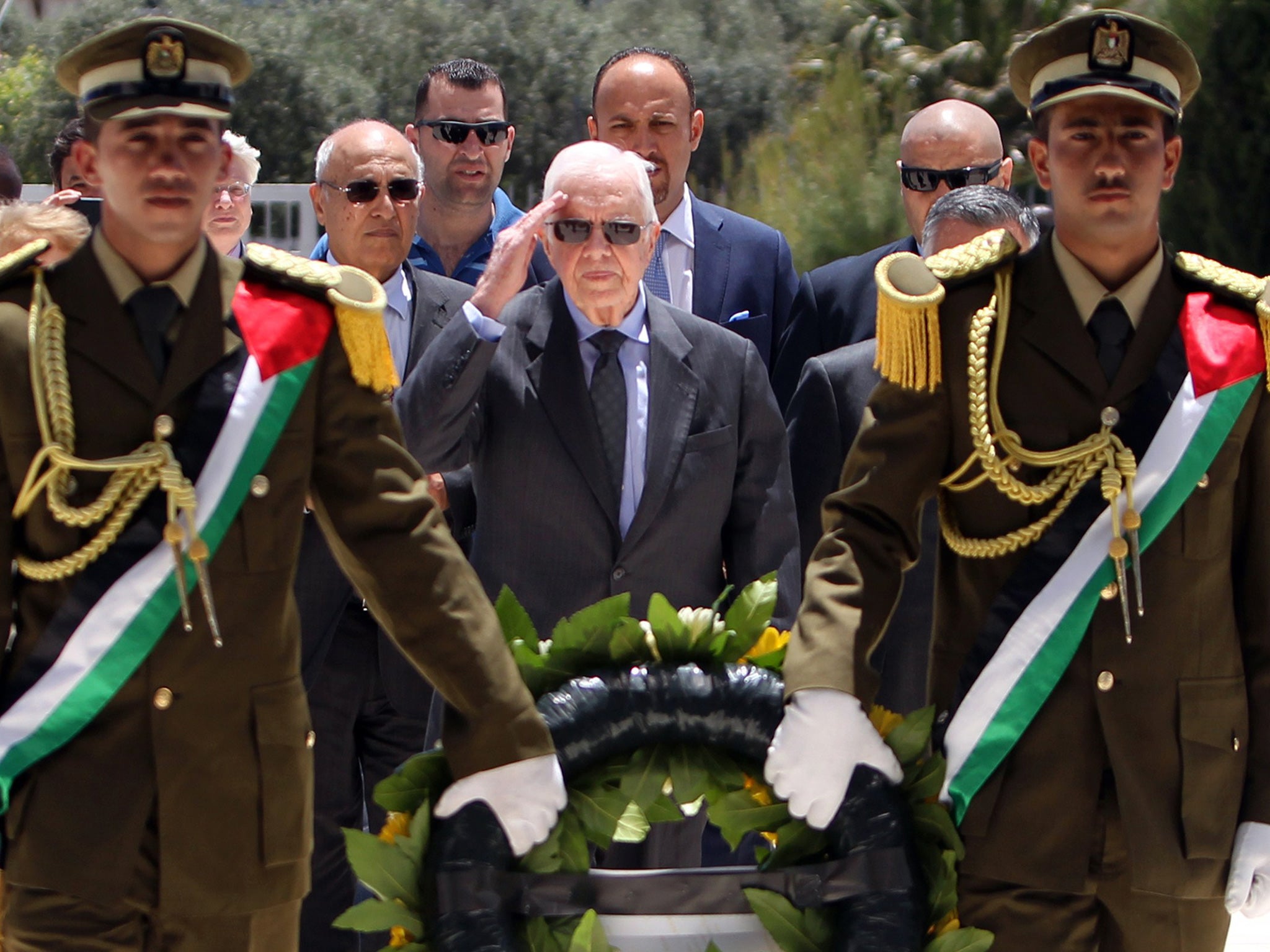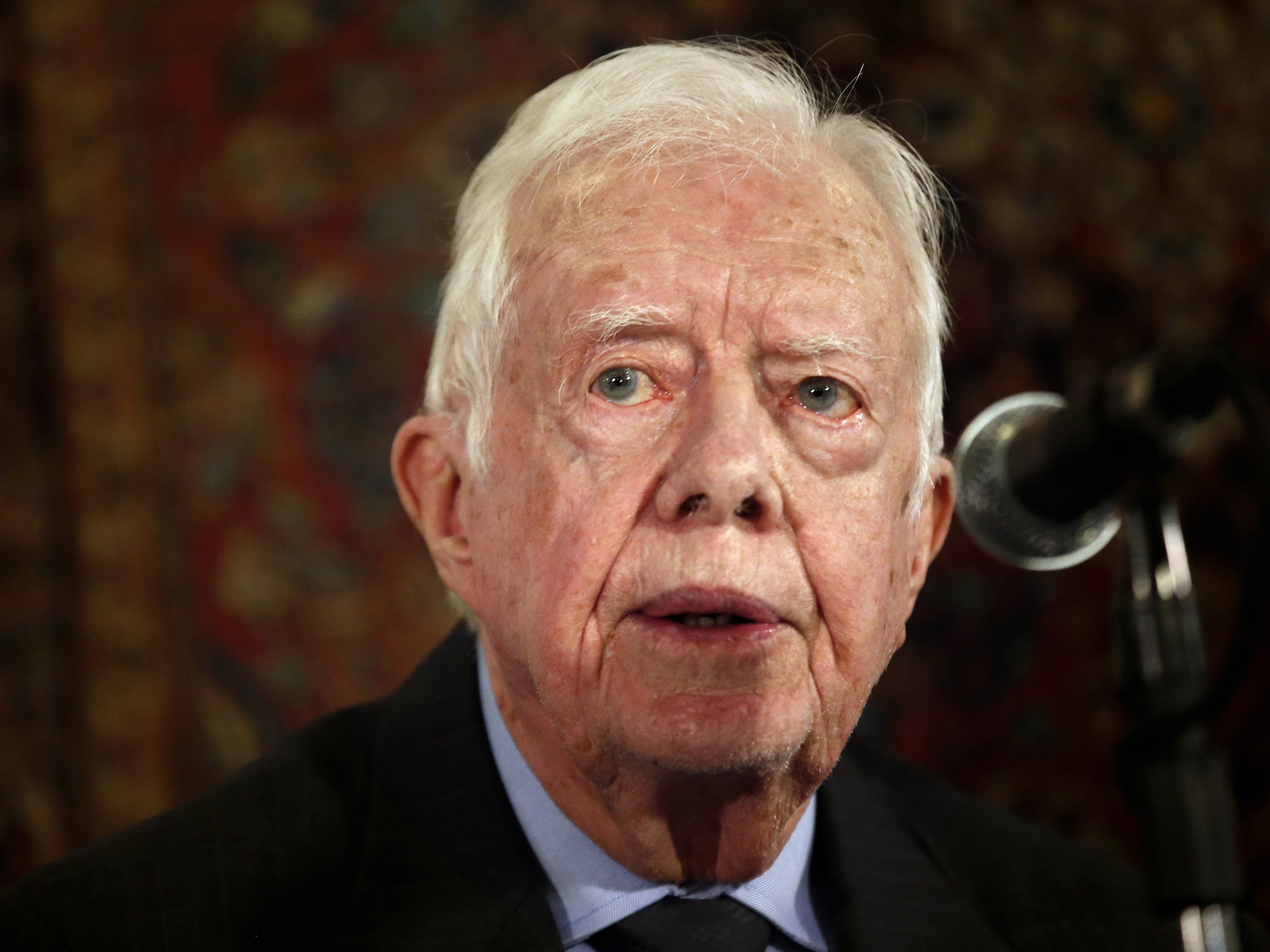Former US President Jimmy Carter says Benjamin Netanyahu 'has never believed in a two state solution for Israel and Palestine'
Carter was on a three-day mission to Israel and the West Bank

Your support helps us to tell the story
From reproductive rights to climate change to Big Tech, The Independent is on the ground when the story is developing. Whether it's investigating the financials of Elon Musk's pro-Trump PAC or producing our latest documentary, 'The A Word', which shines a light on the American women fighting for reproductive rights, we know how important it is to parse out the facts from the messaging.
At such a critical moment in US history, we need reporters on the ground. Your donation allows us to keep sending journalists to speak to both sides of the story.
The Independent is trusted by Americans across the entire political spectrum. And unlike many other quality news outlets, we choose not to lock Americans out of our reporting and analysis with paywalls. We believe quality journalism should be available to everyone, paid for by those who can afford it.
Your support makes all the difference.Former president Jimmy Carter, wrapping up his three-day mission to Israel and the West Bank on Saturday night, said prospects for renewed peace talks were so distant that he didn’t even discuss the matter with the Palestinian leadership.
Carter said that Israeli Prime Minister Benjamin Netanyahu “does not now and has never sincerely believed in a two-state solution for Israel and Palestine.”
On the final day of his reelection campaign in March, Netanyahu said that as long as he serves as prime minister, there will not be an independent Palestinian state.
After his decisive victory, Netanyahu sought to edit his remarks, explaining that the time was not right and that the Middle East was too dangerous now for Israel to withdraw from the occupied territories that the Palestinians want for a future state.
“I don’t want a one-state solution. I want a sustainable, peaceful two-state solution. But for that, circumstances have to change,” Netanyahu told MSNBC in an interview in March.
Netanyahu’s initial rejection of a two-state solution to the decades-old Israel-Palestinian conflict stunned the White House. Netanyahu’s amended remarks were brushed aside by President Obama, who told the Huffington Post in an interview, “We take him at his word when he said that it wouldn’t happen during his prime ministership.”
In East Jerusalem on Saturday, Carter, 90, said that he and his traveling companion, former Norwegian prime minister Gro Harlem Brundtland, did not ask for a meeting with Netanyahu or his cabinet because they assumed they would be rebuffed as past requests were.
“It would be a waste of time to ask,” Carter said.
Brundtland said, “They don’t want to listen to views they don’t agree with.”
A senior spokesman for Netanyahu said that his office had no comment.
Israeli President Reuven Rivlin declined to meet with Carter, though Shimon Peres, Rivlin’s predecessor in the largely ceremonial post, often did. According to Israeli media, Israeli diplomats called Carter’s positions “anti-Israel.”
As president, Carter was instrumental in negotiating a peace deal between Israel and Egypt. Today he is seen as a hostile critic by many Israelis. In a bestseller published in 2006, Carter suggested that Israel’s military occupation in the West Bank is comparable to the apartheid system in South Africa. During the summer war between Israel and Hamas, Carter said that both sides appeared to be committing “war crimes.”
Carter did meet with Palestinian Authority President Mahmoud Abbas, who told the former president that he was ready to move forward on parliamentary and presidential elections as soon his archrival, the Islamist militant movement Hamas, was ready.

The two sides have repeatedly promised elections but found reasons to stall. Abbas and his Fatah party formed a “national unity” government with Hamas last year, but the two political factions have failed to share power, and Hamas, which rules the Gaza Strip and fought a 50-day war with Israel over the summer, refuses to surrender control of the impoverished coastal enclave, which suffers under a partial trade and travel blockade enforced by Israel.
Carter came to Israel as a leader of the Elders, an independent group of former leaders who advocate for peace and human rights, first brought together by Nelson Mandela in 2007.
The delegation planned to go to the Gaza Strip and meet with Hamas leaders, but the trip was canceled at the last minute and Carter did not speak with anyone from Hamas.
Carter blamed “severe” security challenges for the cancellation but would not elaborate.
Carter advocates negotiations with Hamas, a group that the United States and Israel consider a terror organization.
Carter called the lack of reconstruction in Gaza “intolerable.” He said: “Eight months after a devastating war, not one destroyed house has been rebuilt, and people cannot live with the respect and dignity they deserve.”
© Washington Post
Subscribe to Independent Premium to bookmark this article
Want to bookmark your favourite articles and stories to read or reference later? Start your Independent Premium subscription today.
Join our commenting forum
Join thought-provoking conversations, follow other Independent readers and see their replies
Comments